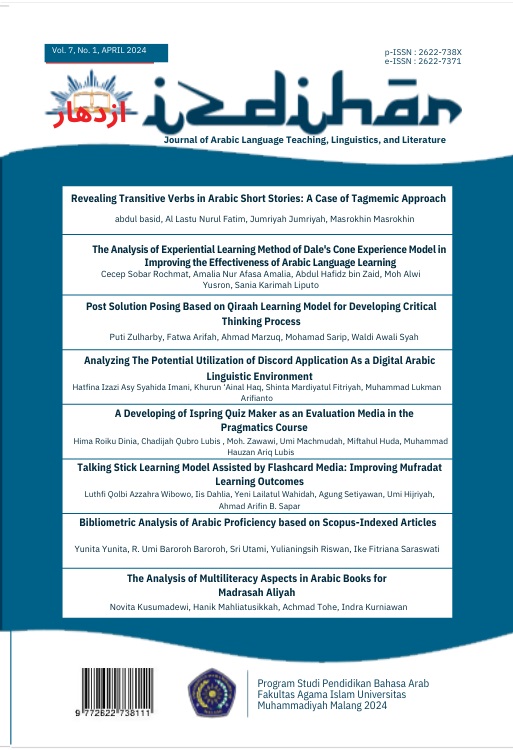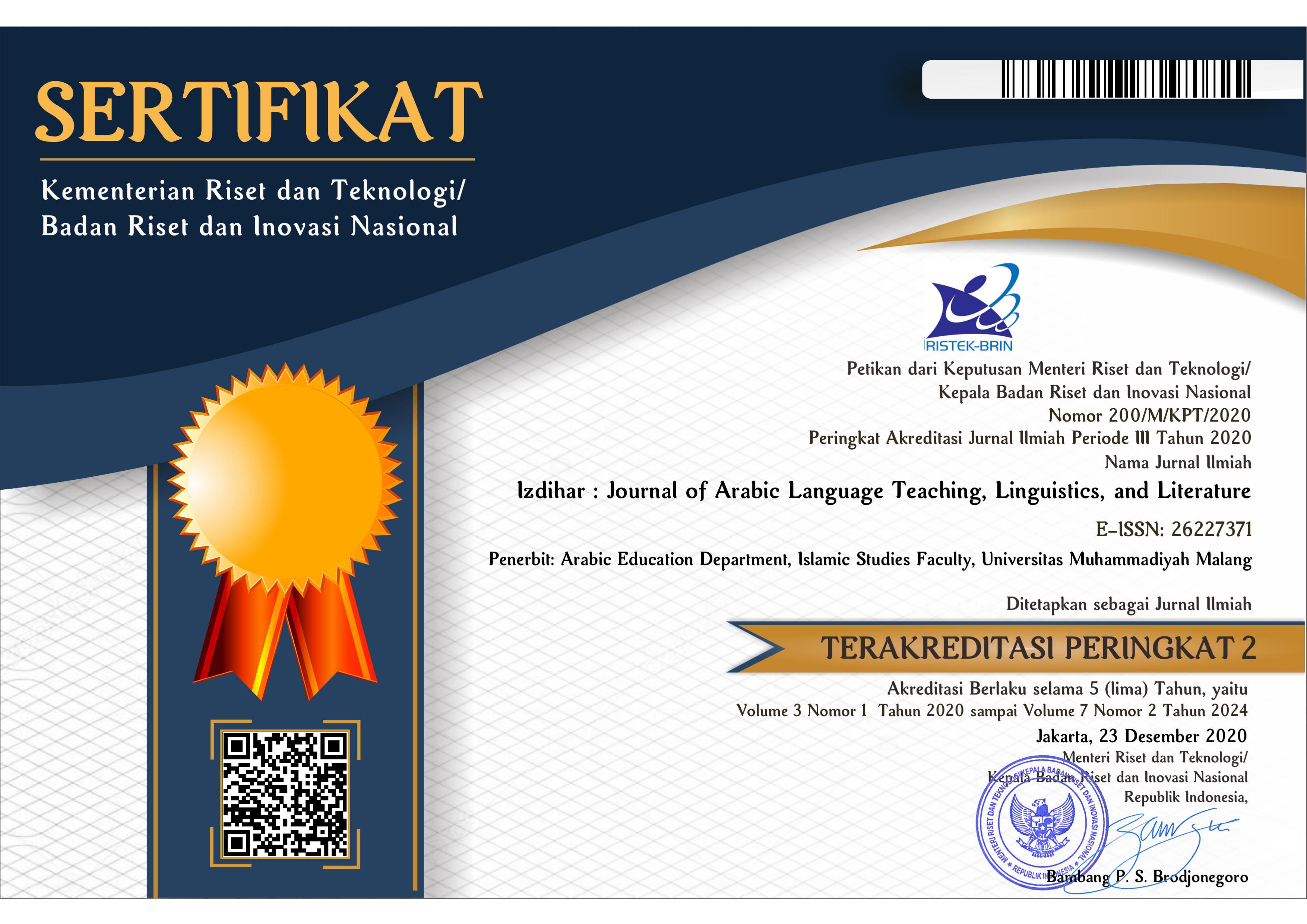Post Solution Posing Based on Qiraah Learning Model for Developing Critical Thinking Process
DOI:
https://doi.org/10.22219/jiz.v7i1.28835Keywords:
Teaching, Reading, Post-Solution PosingAbstract
This research aimed to provide solutions to Qiraah teachers, in order to train and develop students' thinking abilities through a post-solution position-based learning model. The development of the learning model is based on the Qiraah learning constraints and problems faced by lecturers and students, which are obtained from needs analysis. The post-solution posing model applies six phases in learning activities, namely establishing set, comprehension, social interaction, explain, feedback, and extended practice. This research used research and development method. Data are collected through questionnaire, interview, document, and test conducted in the Arabic Language Education Study Program involving 45 students. The effectiveness of the six phases of the post-solution posing model which has been tested on learning through Qiraah using the one-group pretest-posttest technique, produces a significance value (2-tailed) of 0.000 (p < 0.05). This shows a significant increase in scores, so that the post-solution position learning model in the Qiraah course is considered effective for training the development of thinking skills in students.
Downloads
References
Amalia, F. N. (2017). Kemampuan Membaca Pemahaman Mahasiswa. Seminar Nasional Pendidikan Bahasa Indonesia Universitas Sriwijaya, (1), 42–54. https://conference.unsri.ac.id/index.php/SNBI/article/view/502
Amila Sholiha, R Umi Baroroh, & Razita binti Abdullah. (2023). Innovation in Reading Skills Assessment in Arabic Textbooks Based on HOTS Assessment. Izdihar : Journal of Arabic Language Teaching, Linguistics, and Literature, 6(2). https://doi.org/10.22219/jiz.v6i2.27151
Aprianingtyas, M., Suparmi, & Widha Sunarno. (2020). Peran Interaksi Sosial Dan Kemampuan Berpikir Kreatif Siswa Terhadap Kemampuan Memahami Konsep. Prosiding Konferensi Pendidikan Nasional “Strategi Dan Implementasi Pendidikan Karakter Pada Era Revolusi Industri 4.0,” 158–165.
Arifin, Z., Febriani, S. R., Desrani, A., Mahmudi, A., & Bedra, K. G. (2022). Critical Tracing of Arabic Language Acquisition in Indonesian Context. Izdihar: Journal of Arabic Language Teaching, Linguistics, and Literature, 5(2), 183–194. https://doi.org/https://doi.ord/10.22219/jjz.v5i2.20745
Creswell, J. W. (2014). Research Design: Qualitative, Quantitative, and Mixed Methods Approaches. In Sage (4th ed). https://doi.org/10.1007/s13398-014-0173-7.2
Divrik, R. (2023). Effect of Teaching Mathematic Supported by Problem-Posing Strategies on Problem Posing Skills. International Journal of Modern Education Studies, 7(2), 371–408. https://doi.org/http://doi.org/10.51383/ijonmes.2023.308
English, L. D. (1997). The development of fifth-grade children’s problem posing abilities. Educational Studies in Mathematics. https://doi.org/http://dx.doi.org/10.1023/A:1002963618035
Faizah, R. (2018). Implementing the Method of Memorizing Vocabulary in Pushing Students to Learn Arabic. Langkawi: Journal of The Association for Arabic and English, 4(1), 65–70. https://doi.org/10.31332/lkw.v4i1.804
Ghofur, A., & Raharjo, N. R. B. (2018). Peningkatan Kemampuan Berfikir Kritis Mahasiswa Melalui Pendekatan 5E Dan Sets Berbantu Aplikasi Media Sosial. JINoP (Jurnal Inovasi Pembelajaran), 4(2), 102. https://doi.org/10.22219/jinop.v4i2.6678
Haniefa, R. (2022). Implementasi Model Penilaian HOTS pada Penilaian Empat Keterampilan Berbahasa Arab. Ta’limi: Journal of Arabic Education & Arabic Studies, 1(1), 49–71. https://doi.org/http://doi.org/10.53038/tlmi.v1i1.11
Irwan. (2011). Pengaruh Pendekatan Problem Posing Model SSCS dalam Upaya Meningkatkan Kemampuan Penalaran Matematis. Jurnal Penelitian Pendidikan, 12(1), 1–13.
Nasrulloh, I., & Ismail, A. (2018). Analisis Kebutuhan Pembelajaran Berbasis ICT. Jurnal Petik, 3(1), 28. https://doi.org/10.31980/jpetik.v3i1.355
Nation, I. S. P., & Macalister, J. (2010). Language curriculum design. https://doi.org/10.1093/elt/ccs010
Nurmita, F., & Linesti, E. (2018). Pengembangan Model Pembelajaran Problem Posing Dalam Kelompok Belajar Untuk Meningkatkan Hasil Belajar Mahasiswa. Jurnal MathEducation Nusantara, 1(2), 82–88. http://dx.doi.org/10.54314/jmn.v1i2.33
Putra, B. M., Salahudin, M., & Oya, A. (2021). Proses Berpikir Mahasiswa dalam Pengajuan Soal Matematika Tipe Post Solution Posing Ditinjau dari Gaya Kognitif Field Dependent dan Field Independent. DIKMAT: Jurnal Pendidikan Matematika, 01(02), 17–23. https://doi.org/10.56842/dikmat.v1i02.23
Rahim, F. (2008). Pengajaran Membaca. Bumi Aksara.
Rahmawati, N. (2018). Pembelajaran Bahasa Arab: Menuju Higher Order Thinking Skills (HOTS). Konasbara: Prosiding Konferensi Nasional Bahasa Arab IV, (6), 149–154. Retrieved from https://prosiding.arab-um.com/index.php/konasbara/article/view/265
Restuningsih, A., Dantes, N., & Sudiana, N. (2017). Kemampuan Membaca Kritis Ditinjau dari Kemampuan Berpikir Kritis dan Minat Membaca pada Siswa Kelas V Sd Kristen Harapan Denpasar. PENDASI : Jurnal Pendidikan Dasar Indonesia. 1(1). https://doi.org/10.23887/jpdi.v1i1.2680
Satwika, Y. W., Laksmiwati, H., & Khoirunnisa, R. N. (2018). Penerapan Model Problem Based Learning untuk Meningkatkan Kemampuan Berfikir Kritis Mahasiswa. Jurnal Pendidikan (Teori Dan Praktik), 3(1), 7. https://doi.org/10.26740/jp.v3n1.p7-12
Silver, E. ., & J, C. (1996). An Analysis of Arithmetic Problem Posing by Middle School Student. Journal for Research in Mathematic Education, 27(5), 521–539. https://doi.org/http://doi.org/10.2307/749846
Siswono, T. Y. E. (2000). PROBLEM POSING: Sebuah Alternatif Pembealjaran yang Demokratis. Retrieved from http://www.verypdf.com/
Sugiyono. (2016). Metode Penelitian dan Pengembangan. Alfabet.
Ulya, N. M. (2017). Kepribadian Ekstrovert-Introvert Dan Pemerolehan Bahasa Kedua Perspektif Psikolinguistik Pada Santri Pondok Modern. Nadwa, 10(1), 1–25. Retrieved from http://journal.walisongo.ac.id/index.php/Nadwa/article/view/867/769
Yaumil, S. S., Yuhana, Y., & Rafianti, I. (2020). Post Solution Posing dengan Cooperative Tipe Berkirim Salam dan Soal terhadap Kemampuan Pemecahan Masalah. Prisma, 9(1), 77. https://doi.org/10.35194/jp.v9i1.922
Downloads
Published
How to Cite
Issue
Section
License
Copyright (c) 2024 Puti Zulharby, Fatwa Arifah, Ahmad Marzuq, Mohamad Sarip, Waldi Awali Syah

This work is licensed under a Creative Commons Attribution-ShareAlike 4.0 International License.
Copyright Notice
Authors who publish with this journal agree to the following terms:
- Authors retain copyright and grant the journal right of first publication with the work simultaneously licensed under a Creative Commons Attribution-ShareAlike 4.0 International License that allows others to share the work with an acknowledgment of the work's authorship and initial publication in this journal.
- Authors are able to enter into separate, additional contractual arrangements for the non-exclusive distribution of the journal's published version of the work (e.g., post it to an institutional repository or publish it in a book), with an acknowledgment of its initial publication in this journal.
- Authors are permitted and encouraged to post their work online (e.g., in institutional repositories or on their website) prior to and during the submission process, as it can lead to productive exchanges, as well as earlier and greater citation of published work (See The Effect of Open Access).
Copyright (c) 2019 Izdihar : Journal of Arabic Language Teaching, Linguistics, and Literature

This work is licensed under a Creative Commons Attribution-ShareAlike 4.0 International License.


















